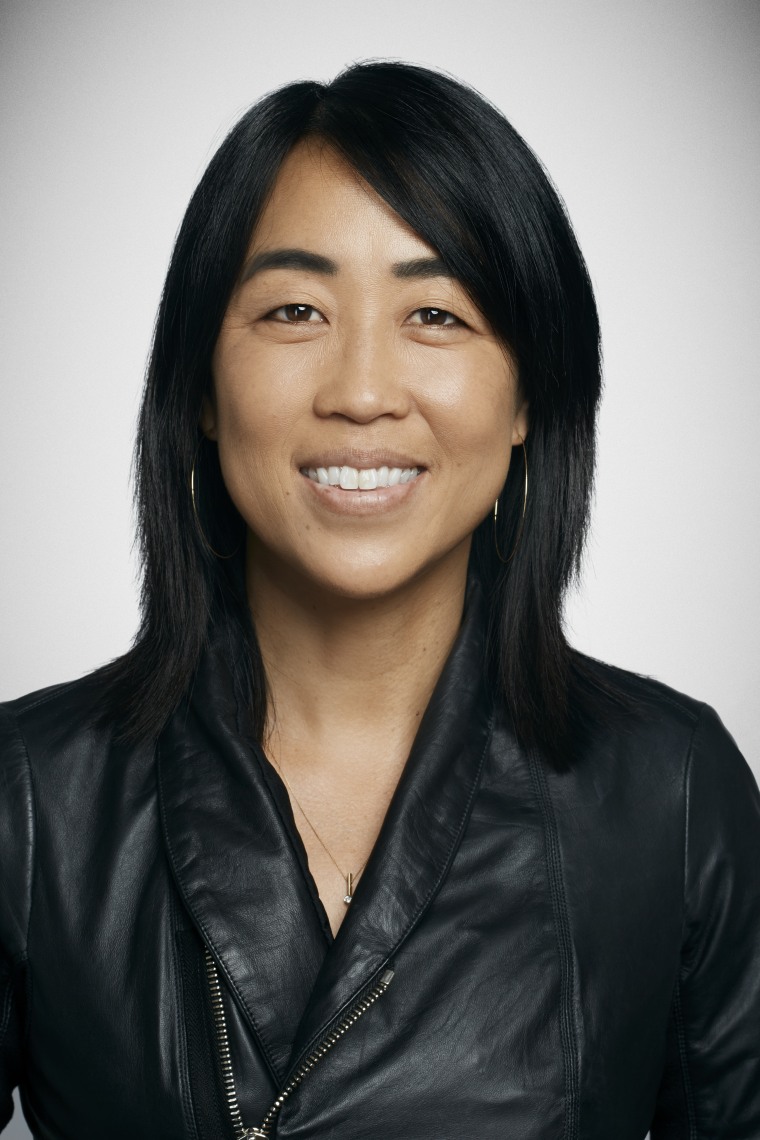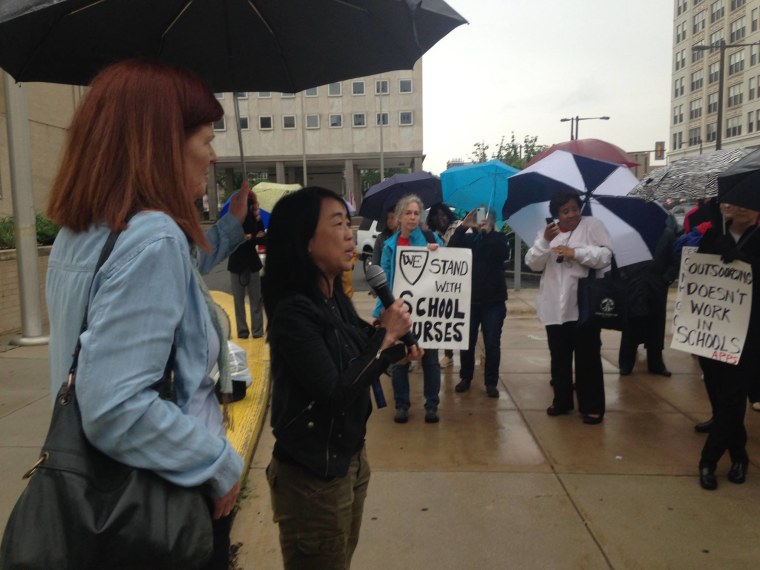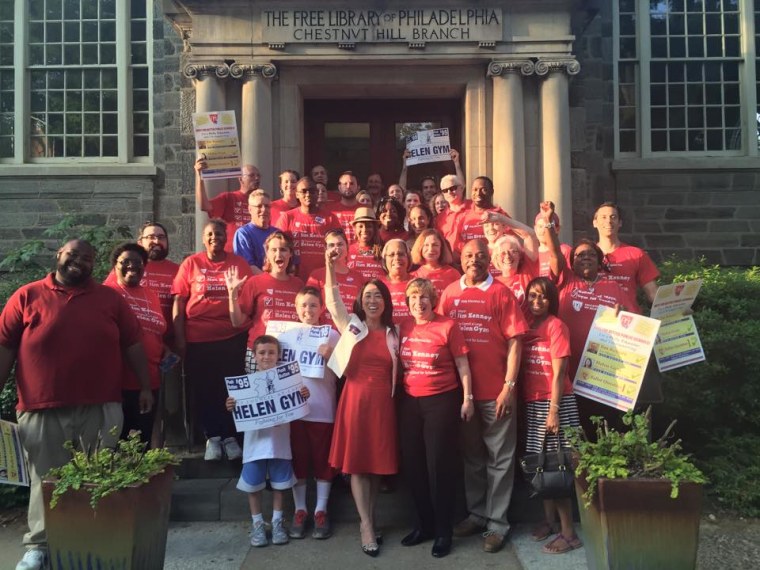Helen Gym took office Monday as the first Asian-American woman to ever serve on the Philadelphia City Council. She will serve in a citywide at-large seat.

A second-generation Korean American, Gym is a longtime grassroots community organizer and public education advocate who rose to national prominence through her work on a 2010 federal civil rights case to end the bullying and harassment of Asian-American students in a Philadelphia high school.
Gym has been a board member and past executive director of Asian Americans United, a Philadelphia Chinatown advocacy organization. She also co-founded an education newspaper and a citywide parent organization that worked to limit privatization and re-invest in Philadelphia’s public schools.
She was also named a White House Cesar Chavez Champion of Change in 2014, The Philadelphia Inquirer’s Citizen of the Year, and one of Philadelphia Magazine’s 75 most influential people in the city.
Gym spoke to NBC News about her new role and her plans for Philadelphia.
RELATED: Long-Standing Education Advocate to Run for Philadelphia City Council
RELATED: International Women's Day: the Legends and Leaders to Know
How did you get started in politics?
For the last 25 years, I’ve worked alongside Philadelphia’s Asian-American and immigrant communities as a community organizer. For groups who don’t have an inside track to power, we have to organize to make change. For us, this boils down to visibility, voice, and driving narratives that not only tackle tough issues but engage the public consciousness. We’ve organized against state-sponsored predatory gambling, the state of our public schools, and for a community’s right to self-determination in its economic development plans. We’re constantly working to build a bigger vision, engage people on the ground, and change our circumstances. To me, this is the essence of what it means to be political.
In 2010, you came to national prominence around a federal civil rights case ending the harassment of Asian-American students in a Philadelphia high school. How have things improved since then?
This was a truly transformative effort. In 2009, the School District of Philadelphia turned a blind eye to relentless physical assaults against Asian-immigrant youth at a local high school. In response, we worked to organize the youth, who spoke out about their experiences and demanded restorative-justice practices and serious attention to bullying and harassment. We were able to win a new principal for the school, bring in new programs, start a student-led climate team, and establish new district policies preventing bullying and harassment.
"Our communities are clear that they want a city vision that focuses on transformational public spaces and lifting up our children and our neighborhoods."
The civil rights settlement between the school district and the U.S. Department of Justice eventually became the blueprint for an even stronger case in Minnesota involving LGBT youth.
But perhaps the most extraordinary change was the development of a new generation of Asian-American leaders from that struggle. Two of the student leaders now head up immigrant-youth-organizing groups in Philadelphia, and one was recently appointed to the city’s Commission on Human Relations. The former principal of the school was just named the deputy mayor for education in Philadelphia as well, and I’ll be headed to city council continuing to drive an education agenda.
Of course, we have a long way to go around ending bullying and harassment in schools, but the most powerful lesson from this struggle was the group of incredibly different individuals who dedicated ourselves to one another and to a larger effort to turn around a school. In doing so, we didn’t just change our circumstances; we changed the ways in which we look at one another.

Why did you run for office and what did you learn on the campaign trail?
I am incredibly inspired by the political shifts I am seeing in our communities. Communities — not political operatives — are setting the moral and political agenda for America’s future — whether that’s reforming our criminal justice system or investing in our public schools and institutions. I really think that a new generation doesn’t just want to see shrines to materialism and capitalism and call that social progress. The energy for change is coming out of communities, and it’s time we brought that energy to our politics.
But the more sobering reason for the timing really had to do with the decision to shutter 24 public schools in one year in Philadelphia. When those schools closed, thousands of children were shuffled off to schools no better than the ones they attended, we lost thousands of jobs, and buildings lay fallow and empty in already disinvested neighborhoods. That was a real wake-up call for me. No matter how flawed or troubled our public systems may be, if we walk away from them, we lose even the opportunity to transform them, and there is nothing in the private market that will rise to adequately take its place.
The energy for change is coming out of communities, and it’s time we brought that energy to our politics.
For years, we’ve been subjected to relentless rhetoric that people don’t want to invest in public institutions anymore, that their schools have failed and their teachers have failed, and that school choice was the only option people had — and they ought to be grateful to those who provided it. But as I campaigned around the city, I was amazed at how many communities had really soured on that idea. Especially in the neighborhoods that suffered from the most disinvestment, people really understand just how important their public institutions and their public spaces are. This is a bigger issue than just schools. Electing officials who want to shut down public institutions, take away services from communities, and cut taxes on the wealthy can no longer be called working in the public interest.
And what was amazing was that the alternative message — to make our public spaces places of transformation and possibility — was incredibly compelling and deeply moving to the people I met. People really understood that we couldn’t lift up our neighborhoods or our cities without lifting our children through our schools and those who teach them. It was a deeply moving, exhilarating campaign built on years of collaboration, partnership, and base building.
What do you have planned for Philadelphia?
I come out of community struggle and ran to ensure that communities have as much voice as the many moneyed entities and lobbyists who often shape our city policies. Our communities are clear that they want a city vision that focuses on transformational public spaces and lifting up our children and our neighborhoods. I intend to work with my fellow colleagues to make those goals a reality.
Do you have any advice for young Asian Americans who might be interested in changing the world?
I always start local.
Grace Lee Boggs, an amazing ancestor, taught me the power of staying in one place and making change there. The biggest lesson is that the most meaningful work is work that is built up over years. There are no shortcuts.
At Asian Americans United, where I’ve spent 25 years of my life, we’re all just ordinary people who’ve learned to work together and figured out how to build a bigger, broader movement over time.
I think the other lesson here is about the difference between political power and a grassroots movement. Political power was not the first thing we sought. Instead, we were really trying to build a stronger base to highlight the voices of different communities across the city. That’s how you change things: when a collective movement builds and earns political power rather than just grasps for it.
Anything else? What’s next?
Serving on Philadelphia’s City Council is a new venture for me, but although I am new to politics, I am not naive. I’ve thought a long time about what it means to work in the public interest, about the fragility of our public institutions, and the importance of vision and engagement to plow through the many obstacles to real progress.
I am incredibly proud to be the first Asian-American woman on Philadelphia’s City Council, but I’ll be more proud to help define an agenda for Asian America that aligns clearly with social- and racial-justice efforts that unites our communities with so many others seeking a new moral agenda for our time.
This interview has been edited for length and clarity.
